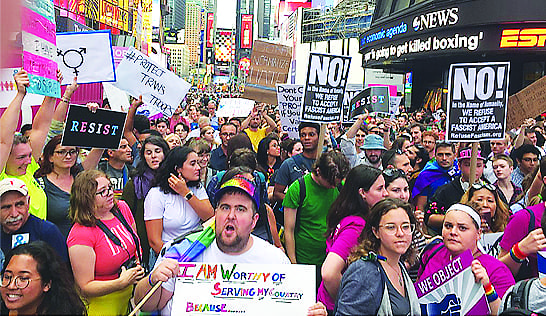
A protest held July 26, 2017 in Times Square outside the U.S. Army Recruiting Center in response to President Trump tweeting that transgender people would no longer be allowed to serve in the U.S. military. Photo by Jere Keys, New York City, USA.
By Harvey Weiner,
JWV National Judge Advocate
Jews, as a community, have always been willing to fight for this country, even prior to its official beginning. Over 360 years ago, when those first 23 Jews came in 1654 from Recife, Brazil, to settle in New Amsterdam, now known as New York City, they were not welcomed by Governor Peter Stuyvesant, he of the well-known peg leg. Nevertheless, they were allowed to stay and some months later, Asser Levy, one of the initial 23 Jewish immigrants, protested to Stuyvesant that Jews were not allowed to stand guard. According to Stuyvesant, the reason why he did not want a Jew to stand guard was because of the discrimination and unwillingness of local residents to serve as fellow soldiers with the Jewish nation and to be on guard with them in the same guard house.Levy insisted however, that, as a manual laborer, he should be able to stand guard like everyone else. Levy appealed to some of the Jewish shareholders of the Dutch East India Company, which owned New Amsterdam and, within two years, Levy had succeeded in standing watch and ward, like the others.
On July 26, 2017, President Trump announced in a series of tweets that transgender troops would no longer be allowed to serve in the military, reversing the policy of the Department of Defense. A formal Presidential Memorandum followed on August 25, 2017. JWV National Commander Carl A. Singer issued a statement on behalf of the JWV opposing this new discriminatory policy. Suit was brought by the transgender community in the United States District Court for the District of Columbia to prevent the Trump Memorandum and its subsequent progeny from being implemented. Doe v. Trump, CA No. 17-1597 (CKK). A preliminary injunction was issued preventing this discriminatory policy from going into effect. This injunction was overturned by the U.S. Supreme Court in January.
The Trump administration has appealed to the United States Court of Appeals for the District of Columbia Circuit on the merits. The JWV was asked by Mary Bonauto, the “Thurgood Marshall” of the LGBTQ movement, if it would be willing to file an Amicus brief in light of Commander Singer’s statement and the JWV agreed. The JWV, along with several other veterans groups, filed a supporting brief on October 29, 2018 with oral argument expected to take place in December, 2018. However, the major veterans groups chose not to join in.
The appeal focuses on the limits of the power of the President as Commander in Chief. Not needing to repeat this legal argument, the JWV brief focused on policy arguments. The proposed ban would make military units weaker, not stronger, because unit cohesion is the product of values and experiences shared by those who serve, and permitting openly transgender personnel to serve does not hinder unit cohesion, but rather enhances it. Furthermore, the proposed ban would arbitrarily exclude capable individuals who are willing to serve their country and would demean all who serve.
“When you are in the military, no one thinks of you as black, or Asian, or gay, or transgender. These are life-and-death situations, and people are just thinking about whether you can do your job and have their backs. Being a service member overshadows any other identity you have.”
A major reason for the transgender ban is undoubtedly similar to the reasons why Asser Levy was initially forbidden to stand guard over 360 years ago, (i.e., others who serve wouldn’t like it). And today, such discrimination based on religious or gender identity is forbidden by the U.S. Constitution. Levy would not have had to appeal to the Netherlands had his situation arose today. He would have had the rule of law on his side.
The right to serve in the military is a value kept alive by the JWV.
Volume 73. Number 1. 2019

